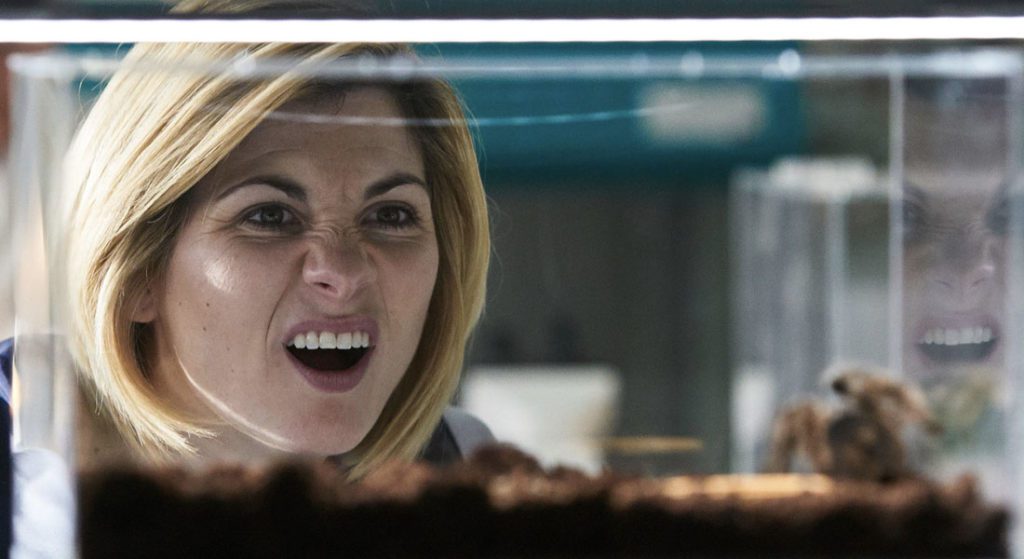Details of Jodie Whittaker’s Regeneration Revealed
The end is nigh; the nightmare is soon coming to a swift end, yet will its conclusion mark salvation or the final damnation? After years of vile and accusatory Doctor Who shoved down the fans’ throats by Jodie Whittaker, Chris Chibnall, and the BBC, their reign of terror is nearly over. This rapidly approaching abolition is reigniting the fans’ love of this franchise to heights not seen since the 13th Doctor’s first fated words on screen. But will Russell T. Davies be able to bring this fallen show back from the very brink of hell’s fiery pit? There is hope now for redemption, and that hope is blossoming more and more with every scrap of news released about season 14’s production and with each passing day toward the death of the 13th Doctor. It won’t be long now before the show’s future is revealed, but until then, we have some news about how this transition will transpire.

A series of quotes from Doctor Who crewmembers and actors were compiled in an article by Salon that gives the fans a glimpse into how Jodie Whittaker’s abdication will occur. The director of Jodie’s final episode, Jamie Magnus, had this to say:
“We shot the last-ever scene in the TARDIS, and said goodbye to the TARDIS, and then there were some tears. And then we went out to film, basically, her regeneration. . . And the last shot that we did, I think, will be the last shot in the episode as well. So it was really nice to do things in sequence. And it was mostly Jodie and [Mandip Gill’s] scenes on that last day. So it was just super-emotional.”
The article further elaborates that the cast and crew of this final episode are excited to bring the audience a regeneration scene that “subverts expectations” by occurring outside the safety of the TARDIS. Any fan of the series can attest that there is nothing brave nor daring by having a regeneration outside of the TARDIS, as many former Doctors ended their time in the iconic role in similar circumstances. The best example of this would be Tom Baker’s 4th Doctor, arguably the best Doctor. Baker’s Doctor fell from a great height in an effort to stop the dastardly Master’s most recent scheme and died in the attempt, peacefully regenerating into the 5th Doctor, Peter Davidson. There is nothing special about this decision, and if the people currently working on the show were truly fans, they would know this.

Beyond the fact that it has been done many times before, a regeneration outside the TARDIS is often not the best option, in New Who especially. Pioneered in Russel T. Davies’s original run and continued by Steven Moffat, the TARDIS became more than just a vehicle in which to travel from point A to point B. The TARDIS became a character in and of itself, beloved by the fans and just as integral to the story as the Doctor himself, providing a needed depth to the Doctor’s wanderings. Jodie Whittaker’s run regressed the TARDIS as a character, as a being, relegating it to a simple transport device with no heart or soul.
The Doctor often regenerated in the TARDIS during the current era because it was tragic to see that Doctor and his TARDIS say goodbye to their former selves simultaneously. There was a bittersweetness to these goodbyes as if the Doctor and the TARDIS were walking hand-in-hand out into the dark, into oblivion, before emerging as new entities with all the memories of their old selves but with a new personality and identity. By robbing the fans of that just to “subvert expectations” and not for a broader story reason is tantamount to sacrilege. It’s disingenuous and offensive to the vibrant character that the TARDIS is to so many fans.
Despite all this, most fans do not care either way how the 13th Doctor dies as long as she dies. The BBC’s desecration of the TARDIS’s character and soul is just a minor issue in an otherwise broken and inept show. This is just another example of how fundamentally Chris Chibnall and the BBC never understood and never could comprehend the magic and power this incredible show once possessed. As such, Jodie Whittaker’s regeneration will not have the enchantment nor the captivation of her predecessors’ scenes. With no relationship between her and the TARDIS, that all too powerful final goodbye between them will be immaterial and entirely out of reach.

In that same article, Jodie Whittaker is quoted, saying:
“I’ve shot my version of regeneration, and it was singularly the most emotional day on set I think I’ve ever had. It’s a really bizarre feeling, because it’s the best time I’ve ever had on a job, and I made the decision to leave it, so it’s a really strange thing to do to yourself.”
These words are vitriol to the fan; they neither endear Jodie nor do they inspire sympathy. The damage was already done a long time ago. Jodie went into the role having never watched a previous episode, and saying that the show was “A practice in the male gaze.” Those are not the words of someone who loves to be on set, and that is not someone who loves this world or is sorry to say goodbye to it. She labels it as “her best job” because it’s the biggest paycheck she’s ever had. There is no love or passion for the role and no genuine grief at departing it; only a regret that her paychecks will stop. The fans have lost all sympathy for whatever hardship she may be going through at this departure, real or imagined, financial or emotional, because of how she’s treated this role and disregarded the fans. She’s only ever spewed hate toward the show that she owes all this financial success to, so why should the fans care or fret over her hardship?

It is still unknown who will be replacing Jodie Whittaker in the role, but returning showrunner Russell T. Davies had some comments as well from an interview with The Radio Times. In stark contrast to Jodie’s attitude toward the series, we have Davies, who very clearly loves this show deeply. He brought it back from the dead once, which required an exorbitant amount of work that he was willing to put in because of his deep love for it.
As such, the fans are deeply excited for his return for a myriad of reasons. Some trust his love to champion over the agenda of the BBC that corrupted the show in the first place, while others look forward to his return to merely see for sure if the show can be saved – a final nail in the coffin that will allow fans to bury their love for the show once and for all, so to speak. In this interview, Davies said:
“There are things coming up that are brand new ways of telling the stories that have never been done before, so it just feels new. I wouldn’t go back if it wasn’t feeling new. But that’s the thing about Doctor Who – every episode is new. Every single episode. I’m sitting here now, 10 pages away from a climax thinking, ‘God, I’ve never written in this territory before – this is strange and new’ – so it’s always new. It’s a self-renewing show.”
Davies’s excitement can be commended and does help endear him further into the hearts of fans. Doctor Who’s ability to “self-renew” is part of the beauty of the show; not many series can continue for 60 years and still have life in them. That is why so many people fell in love with it, and that is why, when the show was so thoroughly debased and murdered by Chris Chibnall and Jodie Whitaker, it hurt so much. Fans cannot build up 60 years’ worth of love for something and then have it torn away and not feel a hole in themselves.
However, many are concerned by Davies’s comments as well. With the current state of the series, a return to form is believed to be the best route forward and possibly the only chance for its survival. If Davies is focusing on something new, that could spell disaster and the show’s final demise. Alternatively, the sheer talent of Davies may prevail in breathing new life into the show, that newness becoming its redemption. At this point, fans will just have to wait and see what happens, but they will know the future of the show eventually, and the torment will finally be over, one way or another.
Comments (1)









I’ll say it a million times. I miss 10 and 11. Great doctors and companions!